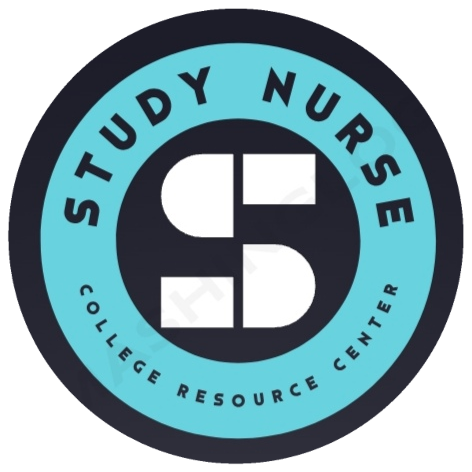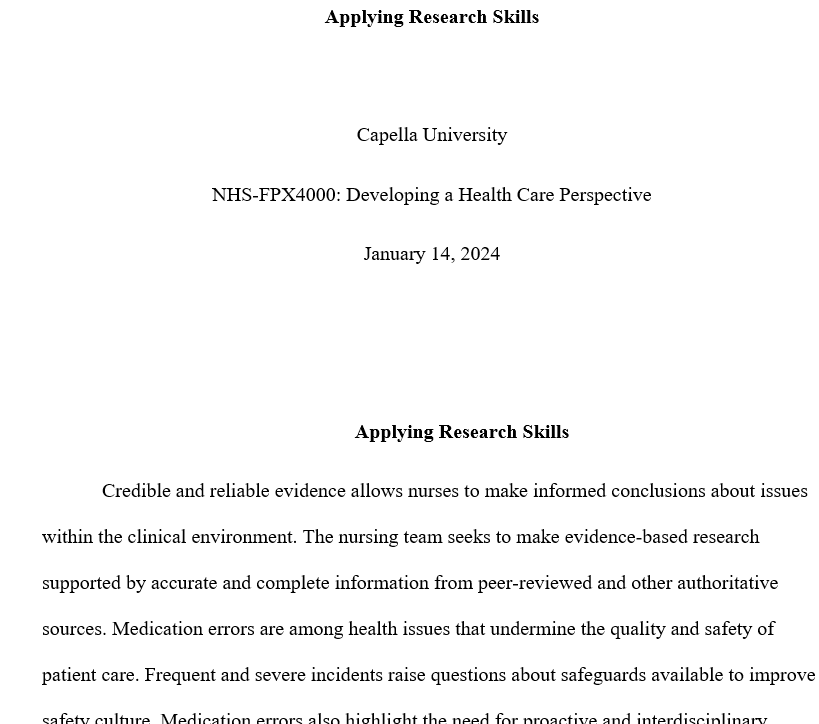Capella University
NHS-FPX4000: Developing a Health Care Perspective
January 14, 2024
Applying Research Skills
Credible and reliable evidence allows nurses to make informed conclusions about issues within the clinical environment. The nursing team seeks to make evidence-based research supported by accurate and complete information from peer-reviewed and other authoritative sources. Medication errors are among health issues that undermine the quality and safety of patient care. Frequent and severe incidents raise questions about safeguards available to improve safety culture. Medication errors also highlight the need for proactive and interdisciplinary frameworks for identifying and intercepting errors. My experience with medication errors is from a case study where a nurse administered Vecuronium instead of Versed. The error resulted in what the court called a reckless homicide. Investigations showed that the nurse overrode safeguards, warnings, and instructions designed to enhance the quality and safety of patient care.
Sources of Information
For this paper, the primary considerations were peer-reviewed journal articles published within the last four years. The PubMed database was the preferred source due to the ease of accessing open-source, current, and high-impact articles on medication errors. The journals identified for this task include, PloS one, BMC Health Services Research, Journal of Pharmaceutical Care and The Joint Commission Journal on Quality and Patient Safety. The source are outcomes of thorough review of methodologies and findings intended to convince healthcare providers to embrace evidence-based strategies for optimizing care outcomes. For credibility, it was necessary to retrieve articles published within the last four years by scholars and researchers with experience and credentials in clinical and nursing research. The peer-reviewed journals articles also clarify the purpose with the abstract providing an overview of the aim, methodology, and conclusions made by authors.
Annotated Bibliography
Ahmed, Z., Saada, M., Jones, A. M., & Al-Hamid, A. M. (2019). Medical errors: Healthcare professionals’ perspective at a tertiary hospital in Kuwait. PloS one, 14(5), 17-23. https://pubmed.ncbi.nlm.nih.gov/31116773/
Ahmed et al. focused on healthcare professionals’ perspectives about medication errors to highlight the need for interdisciplinary collaboration when exploring and preventing errors. The findings describe medication errors, causes, and preventive strategies necessary to maximize patient satisfaction. The authors acknowledged the roles of pharmacists, nurses, physicians, dentists, radiographers, hospital administrators, surgeons, and physiotherapists in initiating evidence-based strategies for preventing medication errors. The interprofessional efforts enable the care team to address issues such as high workload, inadequate support systems, negligence, miscommunication, and non-adherence to safety standards. The rationale for using the article is to highlight the various causes of medication errors and proactive interventions necessary to reduce adverse outcomes for patients, healthcare professionals, and the organization.
Escrivá-Gracia, J., Brage Serrano, R., & Fernández-Garrido, J. (2019). Medication errors and drug knowledge gaps among critical-care nurses: A mixed multi-method study. BMC Health Services Research, 19(1), 1-9. https://bmchealthservres.biomedcentral.com/articles/10.1186/s12913-019-4481-7
The authors addressed the need for adequate drug knowledge to make nurses more responsible and effective when handling medication procedures in a critical care setting. The findings reveal the potentially severe consequences of medication errors in the ICU and the need for adequate training, education, and briefings. The aim is to make nurses aware of the magnitude of medication errors and issues such as personal factors, policies and procedures, and organization of the clinical environment. In this case, the nursing team develops a comprehensive view of multiple factors associated with medication errors and evidence-based strategies for reducing or curbing medication errors.
Gray, S., Effatpanah, M., Salehi, S., Anvari, S. S, Momeni, L., Abedi, G. R., Abbasi, C. A. (2021). Medication errors and reducing interventions: A mixed study in a teaching hospital. Journal of Pharmaceutical Care, 9(1), 3-12. https://jpc.tums.ac.ir/index.php/jpc/article/view/407
Gray et al. addressed the causes of medication errors and viable approaches for identifying and intercepting errors. The authors addressed issues such as lack of professionalism, limited experience in handling specific drugs, inadequate training, and weak policies as the common causes of medication errors. Notably, creating safe environments means reminding nurses about the rights of safe medication administration. The efforts help prevent negligence that cause nurses to override safeguards at different points of the medication administration process. The rationale for using the article is to highlight the need for nurses to embrace personal responsibility and accountability to enable them remain extra-vigilant during medication administration processes.
Schroers, G., Ross, J.G., Moriarty, H. (2021). Nurses’ perceived causes of medication administration errors: A qualitative systematic review. The Joint Commission Journal on Quality and Patient Safety, 47, 38-45. https://www.jointcommissionjournal.com/article/S1553-7250(20)30247-6/pdf
The article focused on the need for organizations to consider nurses perceptions when addressing medication errors. The process entails allowing nurses to share experiences about issues such as workload, interruptions, training, and reporting structures. Considering nurses’ contributions allows organizations to modify factors contributing to medication administration errors. The findings capture the need for a comprehensive approach that provides details of the multiple administrative, human-related, and technical aspects associated with medication errors. Thus, the rationale for using the article is its ability to enable nurses to understand the wide-range of risk factors and their obligation towards identifying and intercepting errors that have adverse impacts on patients’ health and well-being.
Lessons Learnt
Developing the annotated bibliography was an excellent opportunity to understand the right steps for identifying and retrieving credible and reliable sources. The process provided insights into the need for evidence-based strategies for identifying the causes, consequences, and safety improvements necessary for preventing medication errors. Another lesson was the need for clinical researchers to utilize authoritative sources such as peer-reviewed journals articles. The goal is to make informed conclusions about health issues and viable strategies for enhancing the quality and safety of patient care across the continuum.
References
Ahmed, Z., Saada, M., Jones, A. M., & Al-Hamid, A. M. (2019). Medical errors: Healthcare professionals’ perspective at a tertiary hospital in Kuwait. PloS one, 14(5), 17-23. https://pubmed.ncbi.nlm.nih.gov/31116773/
Escrivá Gracia, J., Brage Serrano, R., & Fernández Garrido, J. (2019). Medication errors and drug knowledge gaps among critical-care nurses: A mixed multi-method study. BMC Health Services Research, 19(1), 1-9. https://bmchealthservres.biomedcentral.com/articles/10.1186/s12913-019-4481-7
Gray, S., Effatpanah, M., Salehi, S., Anvari, S. S, Momeni, L., Abedi, G. R., Abbasi, C. A. (2021). Medication errors and reducing interventions: A mixed study in a teaching hospital. Journal of Pharmaceutical Care, 9(1), 3-12. https://jpc.tums.ac.ir/index.php/jpc/article/view/407
Schroers, G., Ross, J.G., Moriarty, H. (2021). Nurses’ perceived causes of medication administration errors: A qualitative systematic review. The Joint Commission Journal on Quality and Patient Safety, 47, 38-45. https://www.jointcommissionjournal.com/article/S1553-7250(20)30247-6/pdf

